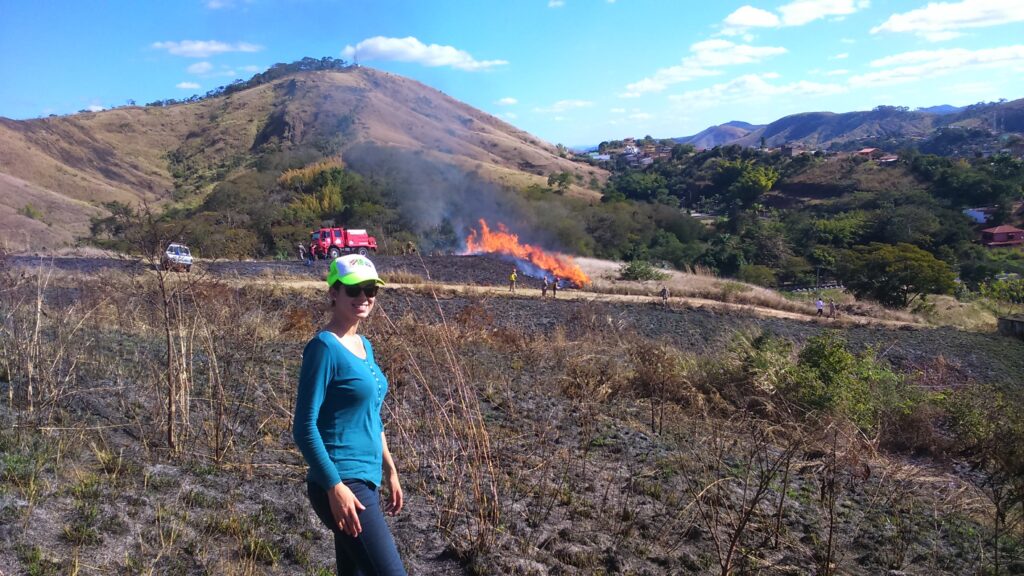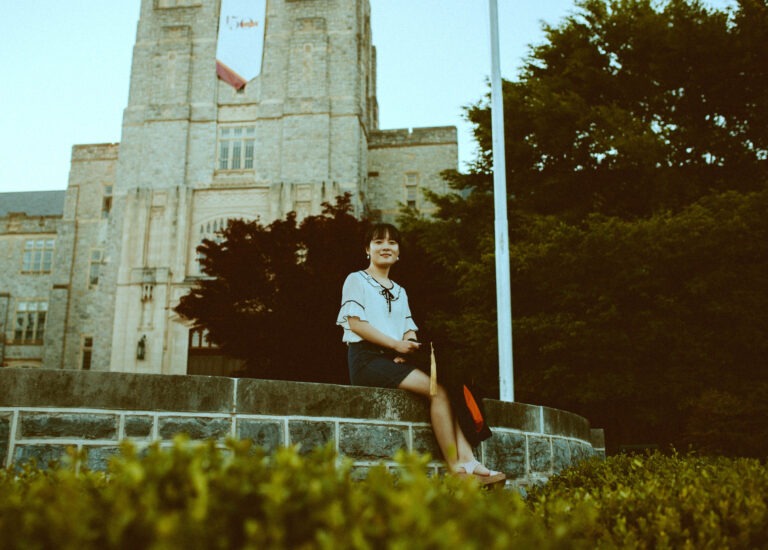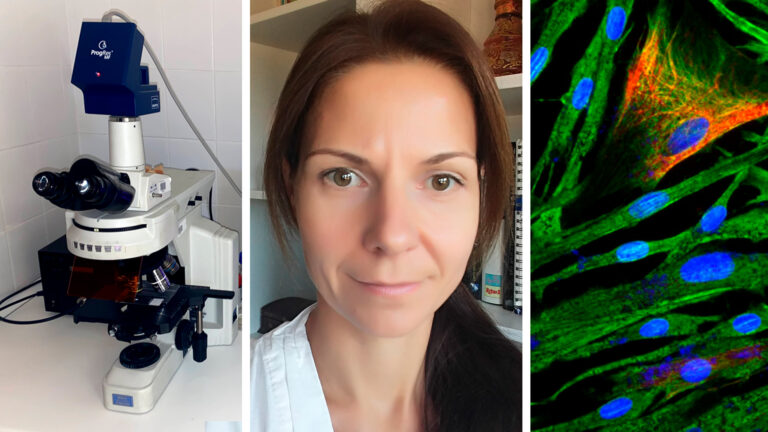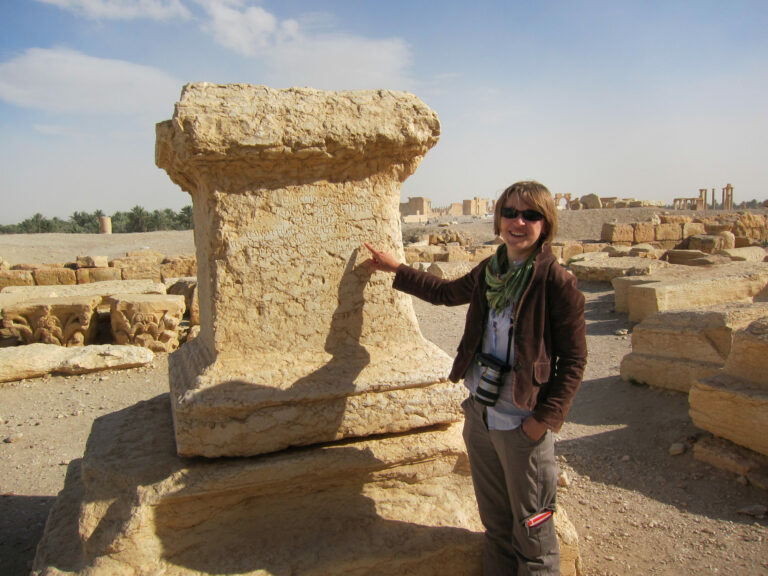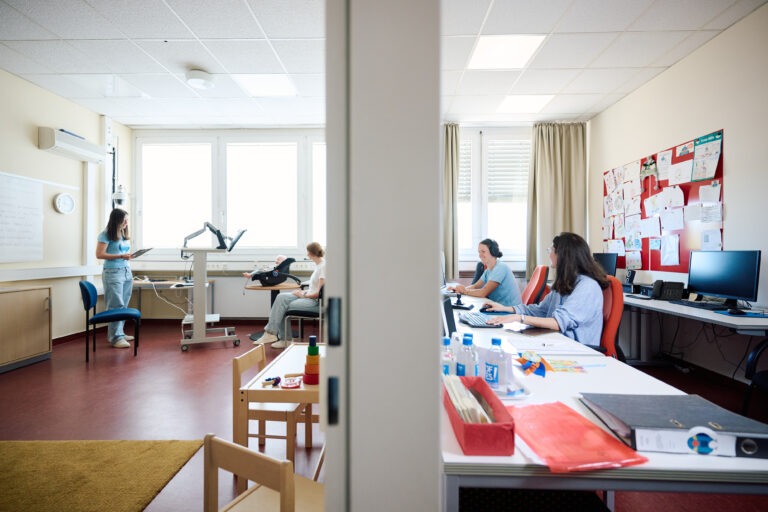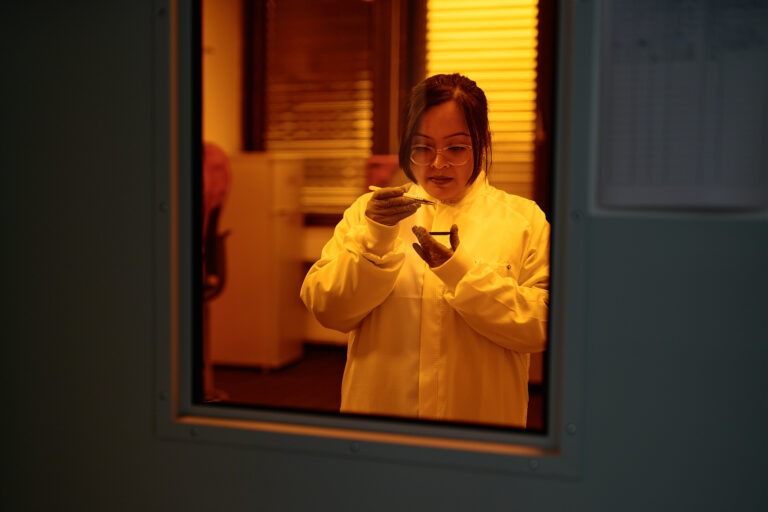
Want to Become a Fire Ecologist? You Better Love Maps! An Interview With Dr. Joana Nogueira Brockmeyer
In the series “33 questions” we introduce, in no particular order, our WiRe Fellows who are currently working on a research project here at the University of Münster. Why 33? Well, if we think of the rush hour of life, it is kind of the age that lies in its middle. And we also like the number😉.
In today’s episode we are speaking with Dr. Joana Nogueira Brockmeyer, an ecologist dedicated to improving the satellite information to characterise and monitoring fire events.

1. What motivated you to work in the field of fire ecology through remote sensing tools?
I have always been fascinated by biological diversity and its many different forms, but I never had a good idea of how everything worked together.
During my first day of class for my Bachelor’s degree in biology, a teacher told us how climate change affects the functioning of ecosystems. He cited an example on how the vegetation of the Brazilian savannahs, the biome in which I lived, is shaped by drought and fire.
I found this so interesting that I went to study in my Master’s degree the functioning of these plants under conditions of water stress. I was able to do field and laboratory work and I returned with data that helped to understand this phenomenon. But I soon realized that droughts were closely linked to fire events. And unlike studies on drought, burning events, in such a huge country like Brazil, are difficult to detect in the field just as they happen. That’s why we have satellites as tools that can basically see everything at any time and place. So I went to get more satellite knowledge from fire experts, and decided to do my PhD in France.
2. Describe your daily work in three words.
Mapping, programming and reading.
3. Describe your research topic in three words.
Fire, ecology, satellites.
4. A good fire ecologist needs …?
to be interested in the processes that are connected to wildfires (like land cover change, gas emissions, vegetation structure, etc), be multidisciplinary, detailed and must love maps!
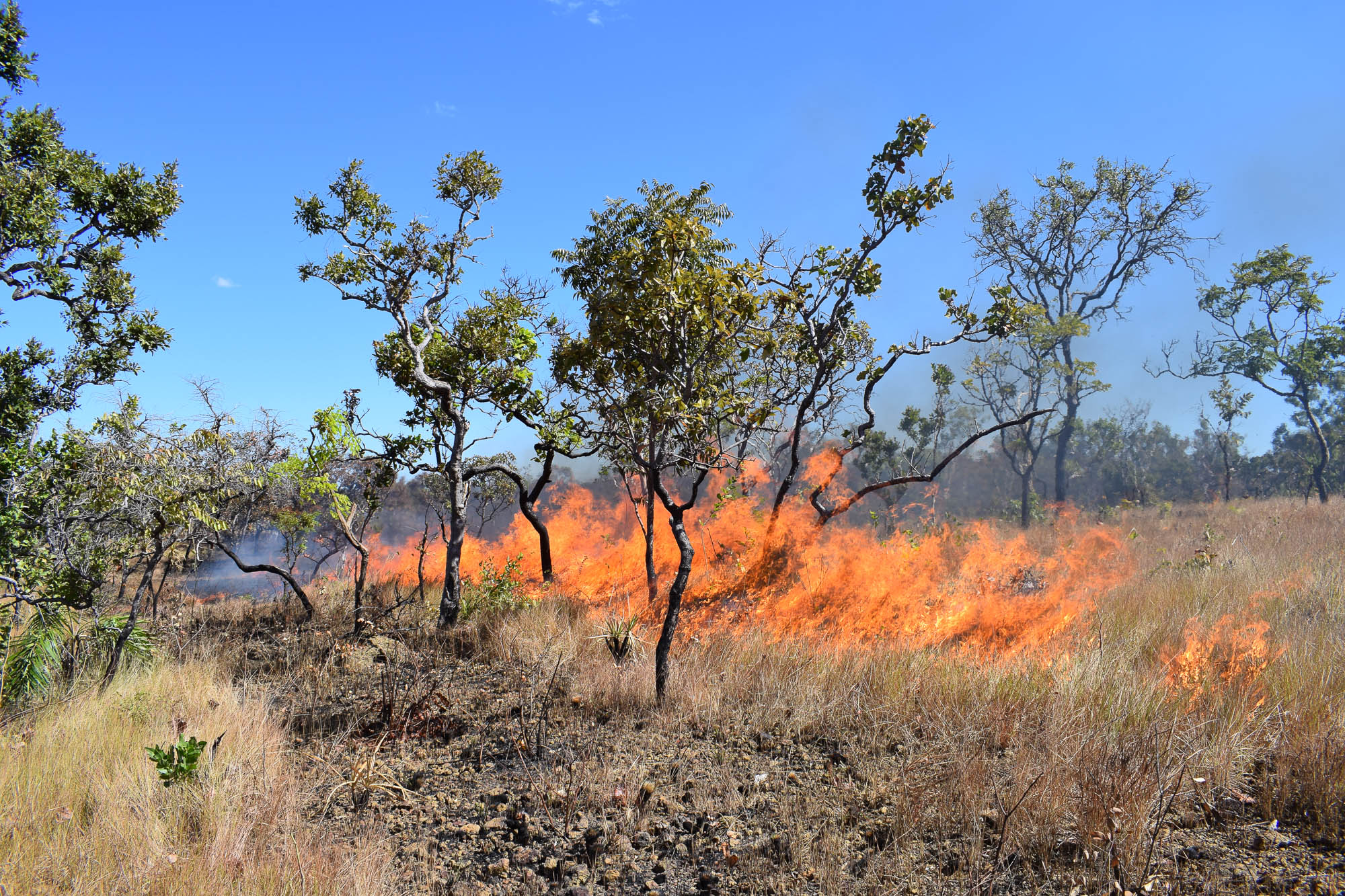
5. What is the best experience you have had as a scientist / researcher?
In order to get to know various types of vegetation where fire occurs, I was able to travel through some really beautiful landscapes.
6. What was your biggest research disaster?
During my doctorate I had to run my first major analysis with satellite images on the institute’s computing cluster. These analyses generated so many temporary files that they locked the node and deleted all my results for an analysis that had ran for weeks.
7. Which (historical) important scientist would you like to have dinner with? What would you ask?
I would like to have a dinner (and a trip to the Galapagos Islands) with Charles Darwin just to see what kind of person he was and how he imagined the variation of species in the world and all the connections with the environment.
8. If time and money were no object: Which research project would you like to do?
I would like to work as a volunteer on a project to save the giraffe species in the world. I love giraffes and these species are becoming increasingly rare. In addition, African savannahs also co-evolved with fire, so I would like to have an opportunity to understand this more closely.
9. What is your favourite research discipline other than your own?
I really like the area of biological evolution, a topic that I only studied during my undergraduate course, but that fascinates me and I think it explains a large part of life.
10. What do you consider the greatest achievement in the history of science/your field?
The development of remote sensing techniques for the acquisition of images from around the globe via satellites, which allow us to have case studies from anywhere in the world without having necessarily to be on site.
11. Which experience in the world of science disappointed you most?
Today the competition in science is really high and there are some researchers who only think about their own ego instead of working together for the common good, a basic principle for me to have advancements in science.
12. How did you survive your PhD time?
I think that my strength of will and the prospect to pursue a doctorate outside of my country were what encouraged me in difficult situations. Besides that, I always had a lot of support from my family, even when we were thousands of kilometers apart.
I also had a very nice working group in France, at the same time that I made comforting friends there. And I can’t forget to mention that I lived in the French city with the most sunny days per year! That definitely helps any Brazilian (if I’m not wrong).

13. What direct or indirect relevance does your research have for society?
Thousands of hectares are burned around the world yearly, causing immense economic, social and environmental damages. Extreme fire events cost billions of euros per year for fire fighting measures, evict millions of people from their homes and destroy many natural ecosystems around the world. However, many places where fires often occur are difficult to access or the fire event is even so extensive that fieldwork throughout the country is infeasible and expensive. In this sense, the use of satellite images and remote sensing techniques helps fire managers to make better decisions to prevent and fight fires for the entire territory and environmentalists to develop strategies for biodiversity conservation. My scientific challenges are to find new ways to evaluate satellite data and provide quality information about fire events.
14. How did you imagine the life of a scientist/researcher when you were a high school student?
I think, as a student, I thought that scientists were people that are very smart and know a lot about everything.
15. Is it actually different? In what way?
It sometimes seems almost the opposite. Yes, you do need to study a lot and gather a lot of information about your field. But in the end you answer some questions where nobody knows the answer and once you find it, you have new questions. So, you are working more in the unknown than in the known.
16. What do you like most about the “lifestyle” of a scientist? And what least of it?
What I like most about a scientist’s lifestyle is to have the freedom to work on your own scientific ideas and intuitions. But on the other hand, there is an enormous pressure to be always innovative and creative.
17. Do you think your career would have evolved differently if you were a man?
I believe that there is still a lot of sexism in all professions, unfortunately. In science and especially STEM it is no different. For this, we (women) still often need to break stereotypes and demonstrate that our professional achievements are important, regardless of our gender.
18. If you were the research minister of Germany, what would you do to improve the situation of women in science?
I would like to improve women’s science incentive programs (like the one in WiRe), adopt referral strategies for women as group leaders at universities and research institutes, and promote annual recognition awards for groups that have women featured in science, since graduation can serve as a form of incentive for these young women to follow the path of research / science.
19. If you had a daughter, what would you advise her not to do?
I would advise my daughter to never stop believing in herself.
20. What is the biggest challenge for you when it comes to balancing family and career?
Often I am not being able to be present, when it comes to important or difficult family matters.
21. How often do you as a friend/partner/mother/daughter sometimes feel guilty when you have to meet a deadline again?
There is always a part of me that feels guilty, when I miss other moments due to having to dedicate myself to work. But in science we always live for working, reading, researching, studying…it is a (hard) daily exercise to reconcile and to be able to make some room for everything else.
22. What is your favourite German word?
‘Glücklich’ because I like the sound of it and it was the first cute word I learned.
23. What makes you most happy about the world?
That there are still people willing to give to others, like so many researchers, doctors, nurses, and so many other professionals working hard to contain the current Corona pandemic.
24. What or who inspired you to become a fire ecologist?
The Brazilian savannahs, known as Cerrado, because I saw in the fieldworks that the fire has a fundamental role in shaping the natural beauty of its ecosystems.
25. Which of your traits bothers you the most in your daily work?
My eagerness about wanting everything to be ready in a blink – the research evolves slowly and takes time to unravel step-by-step.
26. What worries you most about the world?
The neglect of many politicians and leaders with society.
27. Your favourite TV series?
I always liked suspense and crime series. But recently I have seen more films, which are very well produced and have a female protagonist, like Hidden Figures.
28. If you could travel in time: in which epoch and at which discovery or event would you have liked to have been there?
At the time of the dinosaurs, these animals must have been extraordinary 🙂
29. What are the advantages and disadvantages of doing a Research@home-WIRE-fellowship?
The WiRe Fellowship is a great opportunity to reconnect myself with my professional perspectives. And working from home makes it is possible to follow my own schedules as well as save a little bit of time compared to having to travel to a different workplace. The disadvantage is losing the rich discussions that are often happening during unplanned meetings or coffee breaks with the work group.
30. What is your favourite place to relax from research during Corona?
In my living room looking at the garden.
31. What is your favourite place in Münster?
I don’t spend so much time outside the University in Münster because I live in a neighbouring city, but on the way between the train station and the university I sometimes see the sunlight hitting lake Aasee and it gives me peace.
32. What surprised you most about the University of Münster?
This WiRe Fellowship Program, which is a great initiative to encourage women to continue working in science even though often the balance between family and work is not easy.
33. What is the biggest difference between the academic system you have last done research in and the academic system as you experience it in Münster/Germany?
The big difference is that my last job was in an operational system of fire monitoring, which was more applied science designed to meet the demands of fire-fighters, fire managers and data users. Recently, I am returning to academic research at the University of Münster, where at the same time I can participate in activities and classes with undergraduate, master and doctoral students.

